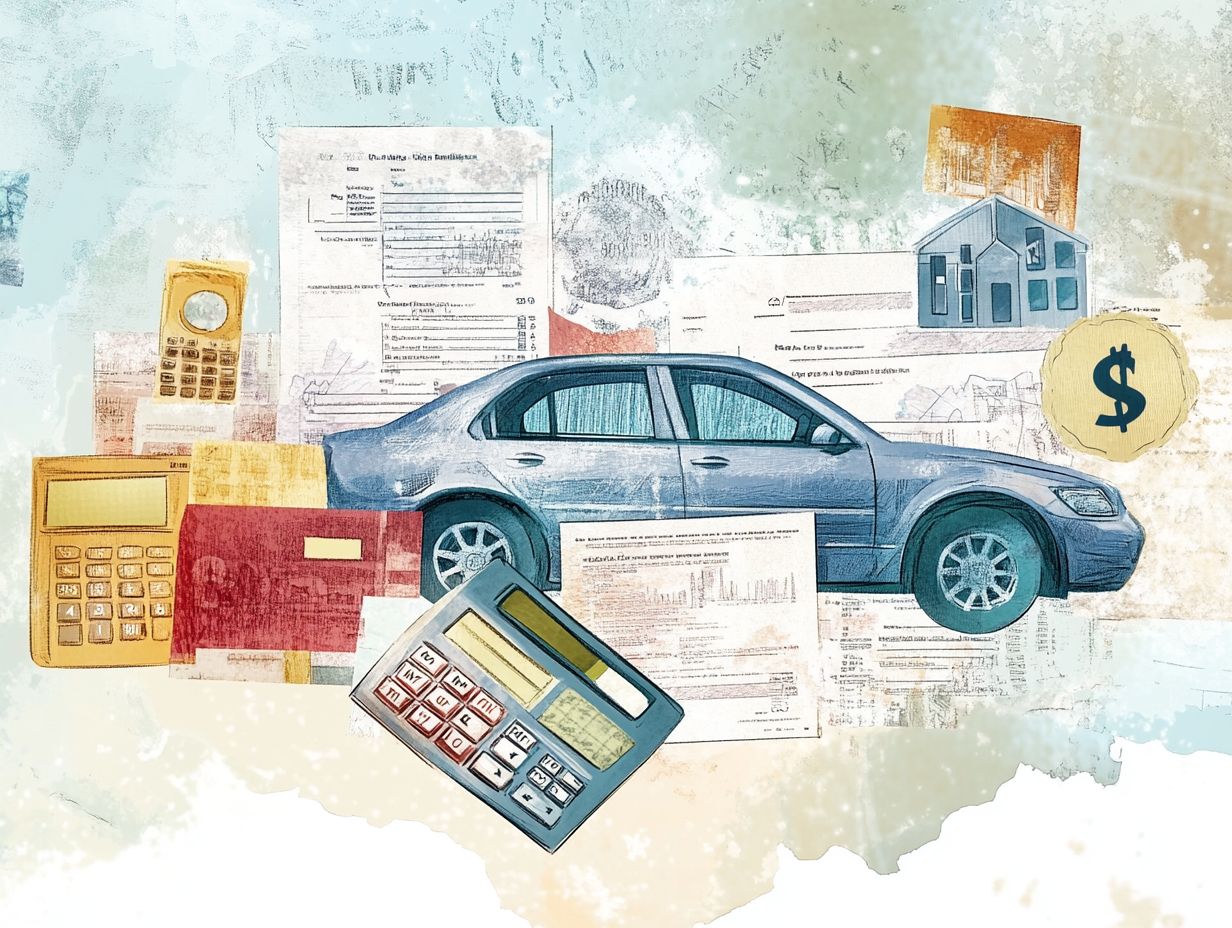The Role of Credit in Kentucky Auto Insurance
Navigating the world of auto insurance in Kentucky can feel like a maze, especially when it comes to grasping how your credit score influences your premiums. Don’t miss out on potential savings!
This guide lays out the essentials of auto insurance in the Bluegrass State, shedding light on the connection between credit and insurance rates. It delves into the factors that affect your credit score, provides practical tips for enhancing it, and examines other elements that can impact your insurance costs.
Whether you re a new driver or simply looking to save on your current policy, this insight will arm you with the knowledge you need to make informed decisions.
Contents
- Key Takeaways:
- Understanding Kentucky Auto Insurance
- Importance of Credit in Auto Insurance
- Factors that Impact Credit Scores
- Improving Credit for Better Insurance Rates
- Other Factors that Affect Auto Insurance Rates
- Frequently Asked Questions
- What is the role of credit in Kentucky auto insurance?
- How does credit affect auto insurance rates in Kentucky?
- What factors do insurance companies consider when using credit in Kentucky auto insurance?
- Can I still get auto insurance in Kentucky if I have bad credit?
- Does my credit score affect my ability to file an auto insurance claim in Kentucky?
- Can I improve my credit score to lower my auto insurance rates in Kentucky?
Key Takeaways:

- Credit plays a crucial role in determining auto insurance rates in Kentucky.
- Factors such as payment history, credit utilization, and credit mix all impact credit scores and therefore affect insurance rates.
- Improving credit can lead to better insurance rates, making it important for drivers to maintain a good credit score.
Understanding Kentucky Auto Insurance
Understanding Kentucky auto insurance is crucial for anyone looking to safeguard their financial well-being while complying with state regulations. As a vehicle owner in Kentucky, auto insurance isn t just a good idea it s a legal necessity, shaped by factors like risk evaluation, claims history, and available coverage options.
The insurance market here is competitive, offering a range of policies that cater to various coverage levels and costs. This guide will explore the nuances of auto insurance, empowering you to make informed choices about your specific insurance needs.
Overview of Auto Insurance
The landscape of auto insurance in Kentucky is shaped by specific laws and regulations that dictate how insurance companies operate and how premiums are determined.
In this unique environment, you ll need to navigate a range of mandatory coverage options that not only protect your vehicle but also ensure your financial responsibility in the event of accidents. Essential coverages, like liability insurance, are legally required. Additional coverage types such as collision and comprehensive insurance can be customized to suit your individual needs.
Insurance producers play a crucial role in this process, guiding you through the many options available and helping you understand how Kentucky’s legal framework influences your policy choices and premium rates. By grasping state-specific requirements, you can empower yourself to make informed decisions and discover the best insurance solutions that align with your lifestyle and budget.
Importance of Credit in Auto Insurance
Credit plays a crucial role in shaping your auto insurance premiums. Insurance companies frequently rely on credit scores to evaluate the risk associated with insuring a driver and to develop their credit-based insurance scoring methods, which is how they set rates based on your credit history.
This approach can have a substantial impact on what you pay for your premiums and your eligibility for different insurance policies.
How Credit Affects Auto Insurance Rates

The relationship between credit scores and auto insurance rates is a key factor that insurance companies weigh heavily when setting your premiums. They examine various elements of your credit profile, looking beyond just your payment history to include credit utilization ratios and existing debt levels.
A robust payment history signals reliability, which can lead to more favorable rates for you. Conversely, a high credit utilization or significant debt may raise red flags, suggesting financial instability and potentially increasing your premiums.
Understanding these dynamics is essential; you should regularly review your credit reports, manage your debt wisely, and aim to make timely payments. By proactively enhancing your credit profile, you not only position yourself to save on insurance costs but also bolster your overall financial health.
As a final step, consider checking your credit score or contacting an insurance agent for personalized advice.
Factors that Impact Credit Scores
Your credit score is shaped by several crucial factors that highlight your financial behavior. Key elements like your credit history which is a record of your borrowing and repayment habits payment history, and credit utilization the amount of credit you use compared to your total credit limit play a significant role in this equation.
Grasping these key components can supercharge your credit profile and elevate your financial standing!
Key Elements that Affect Credit Scores
The key elements influencing your credit score include payment history, credit utilization rates, and the length of your credit history. Each plays a unique role in shaping your overall rating.
By maintaining a consistent record of on-time payments, you enhance your payment history, which typically constitutes a significant portion of your credit score. This demonstrates your reliability to lenders.
Keeping your credit utilization below 30% signals responsible borrowing, positively impacting your overall creditworthiness. A longer credit history usually reflects stability, which can boost your scores, so it s wise to avoid closing old accounts.
These factors don t just affect loan approvals and interest rates; they also significantly influence auto insurance premiums. Insurers often look at credit scores to assess risk, meaning that higher scores can lead to lower insurance rates, ultimately saving you money.
Improving Credit for Better Insurance Rates
Improving your credit score is a pivotal move if you’re looking to secure more favorable insurance rates. A higher credit score often translates to lower insurance premiums, enhancing your overall financial well-being.
Tips for Improving Credit Scores

You can implement several effective tips to improve your credit score, enhancing your financial profile and, subsequently, your auto insurance rates.
Prioritizing the timely payment of all your debts is crucial. You can significantly boost your creditworthiness by establishing a budget that accommodates on-time payments perhaps by setting reminders or automating transactions.
Managing your credit utilization by keeping balances low relative to your credit limits also plays a vital role in maintaining a favorable score.
Regularly monitoring your credit reports for inaccuracies allows you to address any discrepancies that could negatively impact your scores. By following these practical steps, you can achieve meaningful improvement in your credit score, unlocking better financial opportunities for yourself.
Other Factors that Affect Auto Insurance Rates
Beyond credit, various other factors play a crucial role in determining your auto insurance rates. These include your claims history, driving record, the specific vehicle you drive, and the overall risk factors linked to your personal profile.
Understanding these elements empowers you to make informed decisions about your insurance options.
Additional Considerations for Insurance Rates
Along with your individual credit score, several other factors can significantly influence your insurance premiums. Considerations such as your claims history, risk assessments based on your driving habits, and the type of coverage you select all contribute to a more comprehensive understanding of your risk profile.
If you have a history of frequent claims, insurers may view you as a higher risk, leading to increased premiums. Evaluating your driving habits provides valuable insights into your behaviors that could impact the likelihood of accidents. Insurers take these insights into account when calculating your rates.
The type of policy coverage you choose whether it s basic liability or a more comprehensive plan also plays a crucial role in determining your premium, underscoring the need for options that suit your unique risk management needs.
As you navigate these various elements, you ll gain a clearer perspective on how your individual circumstances shape your overall insurance costs.
Frequently Asked Questions
Start improving your credit score today, and watch your insurance rates drop!
What is the role of credit in Kentucky auto insurance?

Credit plays a significant role in determining auto insurance rates in Kentucky. Insurers use credit scores when calculating premiums.
How does credit affect auto insurance rates in Kentucky?
Having a good credit score can lead to lower auto insurance rates in Kentucky. A poor credit score typically results in higher rates because insurers see good credit as a sign of lower risk.
What factors do insurance companies consider when using credit in Kentucky auto insurance?
Insurance companies look at credit history, length of credit, and payment history. These factors help them assess your responsibility in handling money.
Can I still get auto insurance in Kentucky if I have bad credit?
Yes! You can still secure auto insurance in Kentucky with bad credit. However, expect to pay higher rates compared to those with good credit.
Does my credit score affect my ability to file an auto insurance claim in Kentucky?
No, your credit score does not impact your ability to file a claim. If your credit score has improved, you might qualify for a lower premium when renewing your policy!
Can I improve my credit score to lower my auto insurance rates in Kentucky?
Absolutely! You can improve your credit score by paying bills on time and monitoring your credit report for errors. Start early, as this may take some time.



